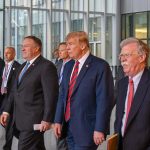Washington, D.C. — January 25, 2019 — In response to a letter from 32 members of Congress to President Trump asking him for a diplomatic, political and humanitarian strategy for Syria, Paul Kawika Martin, Senior Director for Policy and Political Affairs at Peace Action, released the following statement:
“In the wake of President Trump’s announcement of troop withdrawals in Syria, the administration has offered a wide swath of conflicting remarks about the conditions for, timetable for, and the extent of the withdrawal. At the same time, the administration has escalated its bombing campaign in Syria, and disengaged from diplomatic and humanitarian strategies for addressing the conflict and advancing peace. Thankfully, these members of Congress are exercising their oversight authority on questions of war by requesting a comprehensive strategy from the administration. Beyond asking for a strategy, they offer one, calling for robust humanitarian aid as well as active, sustained participation in diplomacy, and supporting an end to U.S. military operations in Syria. There is no military solution to this conflict, and we should withdraw our troops from Syria and end the bombing campaign in the context of a broader strategy to prevent violence and support the peace process.
“Americans need to know what guiding principles and strategies lay behind the administration’s haphazard approach to Syria, so that those principles and strategies can be laid bare and subjected to public debate. Representatives Barbara Lee (D-CA) and Ted Lieu (D-CA) deserve thanks for their leadership in this effort to extract a Syria strategy from this recalcitrant administration. A host of new members of Congress—Katie Hill (D-CA), Alexandria Ocasio-Cortez (D-NY), Ilhan Omar (D-MN), Rashida Tlaib (D-MI)—also signed the letter, foreshadowing a positive shift in Congress towards asserting its authority and exercising oversight on questions of war.”
###
Founded in 1957, Peace Action (formerly SANE/Freeze), the United States’ largest peace and disarmament organization, with over 100,000 paid members and nearly 100 chapters in 36 states, works to abolish nuclear weapons, promote government spending priorities that support human needs, encourage real security through international cooperation and human rights and support nonmilitary solutions to international conflicts. The public may learn more and take action at www.PeaceAction.org.
Full text of the letter:
January 25, 2019
The Honorable Donald Trump
The White House
1600 Pennsylvania Avenue
Washington, D.C. 20500
Dear President Trump:
We write as Members of Congress who have long been concerned about and opposed to U.S. military operations and troop presence in Syria, to urge you to present a long-overdue comprehensive diplomatic, political, and humanitarian strategy for Syria to Congress and the American people. Given the conflicting statements made by your administration, we are also concerned that you are backtracking from your initial decision to withdraw troops.
While we believe there was never a military solution in Syria – nor Congressional authorization for the use of force – we are deeply concerned about the chaotic way in which the withdrawal plan has been rolled out, including continuing confusion over the timeline for the withdrawal and your administration’s lack of a diplomatic strategy in Syria. National Security Advisor John Bolton’s recent statement indicating that U.S. forces could remain in Syria indefinitely directly contradicts your earlier commitment to withdraw U.S. troops immediately. A coherent message from your Administration on troop withdrawal is crucial to advancing a comprehensive diplomatic strategy. We strongly support the withdrawal of American forces from Syria, and at the same time recognize that such a decision nevertheless presents risks that can and must be mitigated through the implementation of a coherent and well-thought-out plan.
We cannot cast a blind eye to the consequences of U.S. policies in Syria. We know that our fight against ISIS came at a dire price to many Syrian civilians and U.S. troops, most recently with the tragic death of 4 brave service members. In Raqqa alone, nearly 80 percent of the city was damaged and destroyed, predominantly by U.S. airstrikes. Aid organizations have reported that thousands of civilians were killed during the effort to liberate the city, yet few families have seen accountability. Your decision to freeze funds allocated for Syrian stabilization has also slowed essential livelihood and recovery activities in places like Raqqa, including the restoration of vital infrastructure. In the wake of reports that U.S. airstrikes in Syria have accelerated since your announcement, we want to ensure that U.S. forces are not simply being replaced by more bombs, particularly in urban environments that are at high risk for civilian casualties. The U.S. has both a moral and strategic obligation to help address the humanitarian crisis in Syria and avoid actions that exacerbate it.
We believe that your administration must prioritize a robust diplomatic and humanitarian strategy in Syria that works towards a sustainable peace plan. Prioritizing stabilization and reconstruction, as well as ensuring the access of humanitarian aid organizations to civilians, is vital to protecting the Syrian people and preventing a renewal of violence that could encourage the resurgence of extremist groups like ISIS. Consequently, the United States should use the full weight of its diplomatic influence and resources to advocate for a political settlement that prevents a resumption of violence in Syria, including in the northeast. Most immediately, the United States must use our leverage with Turkey to prevent further military incursions into Syrian territory, particularly those targeting Kurdish communities there. The U.S. should also be working to revive and strengthen a U.N.-led peace process to secure a ceasefire that protects our partners and ultimately results in a negotiated solution to the Syrian war. To achieve these goals, the United States must engage diplomatically with all parties, rather than linger on the sidelines.
Since Congress has a vital role in achieving our nation’s diplomatic, military, and foreign policy objectives and has the sole power to declare war, we urge you to immediately lay out for Congress your long-term national security, humanitarian, and political strategy in Syria. Specifically, we ask that you answer the following questions by January 31, 2019:
1. What are your political goals in Syria and what is your administration trying to achieve diplomatically?
2. What is your administration’s stabilization plan in Syria? Who will pay for it? What is the role of START Forward during the various stages of troop withdrawal? Who are they working with? How will the U.S. help to safeguard access to essential humanitarian aid?
3. Does your administration have plans to transparently investigate and offer accountability for the civilian deaths and widespread destruction caused by the U.S.-led coalition bombardment of Raqqa, Mosul, and other cities?
4. Is the United States currently consulting with all of our international allies on diplomatic strategies to press for a ceasefire and a comprehensive solution to the crisis?
5. Will the United States consider cutting off military sales or using other diplomatic leverage with Turkey to ensure Ankara does not invade Syria and target our partners, including the predominantly Kurdish-led Syrian Democratic Forces?
6. Will you commit to the full withdrawal of all U.S. troops from Syria, or are you planning to leave residual forces to conduct train-and-equip programs or other assistance?
7. To what extent will the U.S. still conduct air strikes in Syria? What are diplomatic and non-military strategies the administration is employing to starve ISIS of revenue and recruits?
In conclusion, we request that your administration brief Congress and inform the American public of your diplomatic, political and humanitarian strategy in Syria without delay. We owe it to all Americans, especially our brave service members, to help secure a negotiated settlement that ends one of the largest humanitarian crises of our time.
CC: Secretary Pompeo and Acting Secretary Shanahan
Sincerely,
Barbara Lee
Ted Lieu
Eleanor Holmes Norton
Frank Pallone, Jr.
Peter A. DeFazio
Ilhan Omar
Mark Pocan
Zoe Lofgren
Steve Cohen
Ro Khanna
Jared Huffman
Bobby L. Rush
Jim Himes
Anna G. Eshoo
José E. Serrano
Mark DeSaulnier
James P. McGovern
Judy Chu
Karen Bass
Peter Welch
Bonnie Watson Coleman
Katie Hill
Alexandria Ocasio-Cortez
Debbie Dingell
Jan Schakowsky
Rashida Tlaib
Earl Blumenauer
Chellie Pingree
Rosa L. DeLAuro
Jerry McNerney
Nydia M. Velázquez
Raul M Grijalva
If you wish to not receive further emails from Peace Action, please send an email to gmurphy@peaceaction.org with the word “Unsubscribe” in the subject line.



